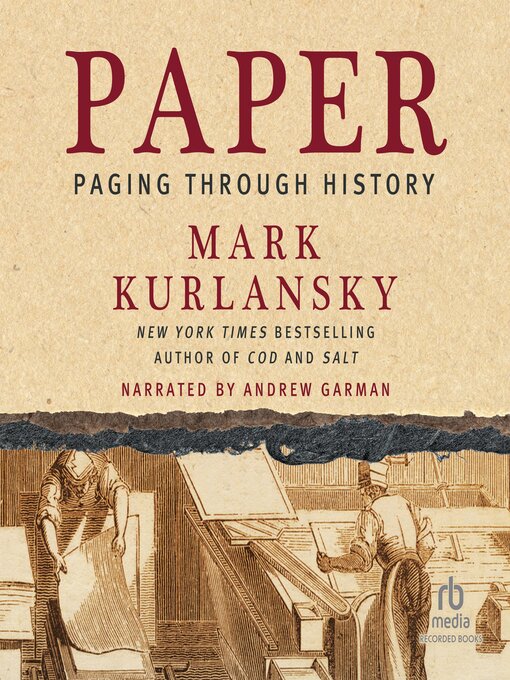Paper is one of the simplest and most essential pieces of human technology. For the past two millennia, the ability to produce it in ever more efficient ways has supported the proliferation of literacy, media, religion, education, commerce, and art; it has formed the foundation of civilizations, promoting revolutions and restoring stability. By tracing paper's evolution from antiquity to the present, with an emphasis on the contributions made in Asia and the Middle East, Mark Kurlansky challenges common assumptions about technology's influence, affirming that paper is here to stay. Paper will be the commodity history that guides us forward in the twenty-first century and illuminates our times.
"[An] historical journey well worth the ride. [Kurlansky] has a deep instinct for telling detail, which he combines with a disarmingly fun narrative style."—Los Angeles Times
-
Creators
-
Publisher
-
Release date
May 17, 2016 -
Formats
-
OverDrive Listen audiobook
- ISBN: 9781501922091
- File size: 394587 KB
- Duration: 13:42:03
-
-
Languages
- English
-
Reviews
-
AudioFile Magazine
An audiobook about paper? Will the contradictions never cease? Actually, in classical times, paper was seen as a threat to developing memory and mental processes. In the Middle Ages, paper saved Western culture. Now we see it as old and wasteful, and are hoping at some point to become a "paperless society." This audiobook fills in the fascinating blanks and shows us how paper shaped the modern world. Andrew Garman uses his deep, authoritative voice to guide us on this historical tour, and he makes it worth the trip. While he does need to vary his voice a bit more, he pauses to let the ideas sink in, and he knows where to emphasize certain facts that are key to the book. This is good history and a great story. R.I.G. © AudioFile 2016, Portland, Maine -
Publisher's Weekly
March 28, 2016
Kurlansky (Salt: A World History) yet again tackles world history via another object often taken for granted in modern society. In straightforward, no-nonsense prose, he traces the narrative of paper—and related inventions such as writing and the printing press—from antiquity to the 21st century. Throughout, Kurlansky operates from the premise that technological change is a symptom of societal change rather than its cause, using the invention of the printing press and developments in paper technology as examples. Unfortunately, having made such a strong claim about history and historical development, he does not adequately cultivate it as a working hypothesis. The book’s real highlights arrive at the end, when Kurlansky examines the contemporary paper industry, addressing environmental concerns and solutions being explored in response. He concludes by arguing not to fear new technology or the disappearance of paper. “This is evolution, not revolution,” he says, pointing out that such arguments against new inventions, including paper, have been around as long as humans. Despite what is both a fascinating topic, as proven by other titles on the history of paper, and a metaphysical experience (for readers of the print edition), Kurlansky’s dull writing style and haphazard employment of his technological thesis make this an unsatisfying work.
-
Loading
Why is availability limited?
×Availability can change throughout the month based on the library's budget. You can still place a hold on the title, and your hold will be automatically filled as soon as the title is available again.
The Kindle Book format for this title is not supported on:
×Read-along ebook
×The OverDrive Read format of this ebook has professional narration that plays while you read in your browser. Learn more here.


